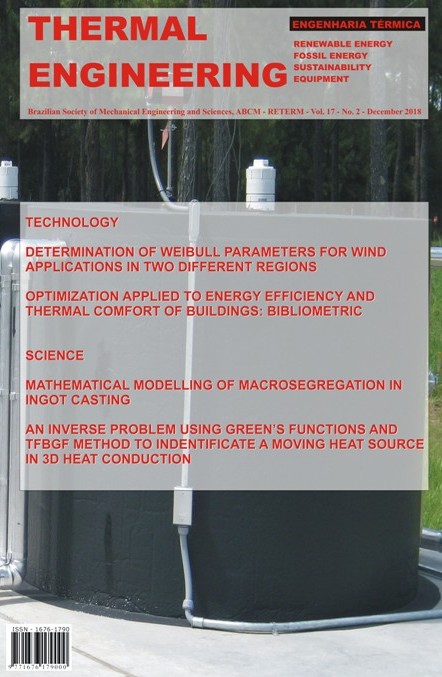| Vol.
17 - No. 2 December 2018 ISSN 1676-1790 |

| AOS AUTORES FOR AUTHORS |
| EDITORIAL EDITORIAL |
| EXPEDIENTE STAFF |
| ENTRE EM CONTATO GET IN TOUCH |
| HOME |
É necessário
o software Adobe Acrobat Reader ou Foxit Reader para a visualização
do material pois os artigos apresentados estão no formato
PDF. Clique aqui para download do Adobe |
| Parceiros |

| Editorial |
|
O editorial de Engenharia Térmica deste número continua a discussão sobre as necessidades de pesquisa científica em áreas vitais em que a engenharia térmica tem participação destacada. O objetivo principal é o de motivar os leitores, dentro de suas especialidades, a identificar possíveis assuntos para sua pesquisa futura. Desde 1996, a Teoria Construtal, desenvolvida por Adrian Bejan, explica cientificamente que a geração de design na natureza é governada por um princípio físico chamado Lei Construtal, que afirma que "para um sistema de fluxo de tamanho finito persistir no tempo (para sobreviver) deve evoluir de forma a facilitar o acesso às correntes que fluem através dele". Este princípio pode ser aplicado na engenharia através do Método Design Construtal. O Design Construtal é a filosofia do design evolutivo em aplicações de engenharia. Atualmente, o Método Design Construtal tem sido amplamente empregado nas áreas de transferência de calor e de mecânica dos fluidos, permitindo entender como a configuração geométrica influencia no desempenho do sistema. Além disso, a associação de Design Construtal com algum método de otimização (por exemplo, Busca Exaustiva ou Algoritmo Genético) permitirá determinar a geometria otimizada do sistema, ou seja, o design do sistema que conduz a um desempenho superior. Na opinião da Engenharia Térmica, a abordagem baseada na Teoria Construtal, Lei Construtal e Design Construtal pode ser adotada para entender e aprimorar sistemas de engenharia envolvendo transferência de calor e/ou mecânica dos fluidos. A missão de Engenharia Térmica é a de documentar o progresso científico em áreas relacionadas à engenharia térmica (e.g., energia, petróleo, combustíveis renováveis). Nós estamos confiantes que continuaremos a receber submissões de artigos que contribuam para o progresso da ciência. Liércio André Isoldi, D.Sc. |
| Editorial |
|
The editorial of Engenharia Térmica of this issue continues the discussion on scientific research needs in vital areas in which thermal engineering has important participation. The main goal is to motivate the readers, within their specialties, to identify possible subjects for their future research. Since 1996, the Constructal Theory, developed by Adrian Bejan, scientifically explains that the design generation in nature is governed by a physical principle called Constructal Law, which states that "for a finite-size flow system to persist in time (to survive) it must evolve in such a way that it provides easier and easier access to the currents that flow through it". This principle can be applied in engineering through the Constructal Design Method. Constructal Design is the philosophy of evolutionary design in engineering applications. Nowadays the Constructal Design Method has been widely employed in heat transfer and fluid mechanics areas, allowing understanding how the geometric configuration influences the system performance. In addition, the association of Constructal Design with some optimization method (for instance Exhaustive Search or Genetic Algorithm) will enable to determine the optimized geometry of the system, i.e., the system design that conduct to a superior performance. In the opinion of Engenharia Térmica the approach based on Constructal Theory, Constructal Law and Constructal Design can be adopted to understand and improve engineering systems involving heat transfer and/or fluid mechanics. The mission of Engenharia Térmica is to document the scientific progress in areas related to thermal engineering (e.g., energy, oil and renewable fuels). We are confident that we will continue to receive articles’ submissions that contribute to the progress of science. Liércio André Isoldi, D.Sc.
|
Autores/Authors | Editorial/Editorial | Contatos/Get in Touch | Expediente/Staff
Outras edições: Vol.1
- nº1 (antes Nº1), Vol.1
- nº2 (antes Nº2), Vol.1
- nº1 (antes Nº3), Vol.1
- nº1 (antes Nº4),
Vol.3
- nº1, Vol.3
- nº2, Vol.4
- nº1, Vol.4
- nº2, Vol.5
- nº1, Vol.5
- nº2, Vol.6
- nº1, Vol.6
- nº2, Vol.7
- nº1, Vol.7
- nº2,
Vol.8
- nº1, Vol.8
- nº2, Vol.9
- nº1-2, Vol.10
- nº1-2, Vol.11
- nº1-2, Vol.12
- nº1, Vol.12
- nº2, Vol.13
- nº1, Vol.13
- nº2,
Vol.14
- nº1, Vol.14
- nº2, Vol.15
- nº1, Vol.15
- nº2,
Vol.16 - nº1,
Vol.16 - nº2,
Vol.17 - nº1.
Copyright © 2003-2018
Todos os direitos reservados